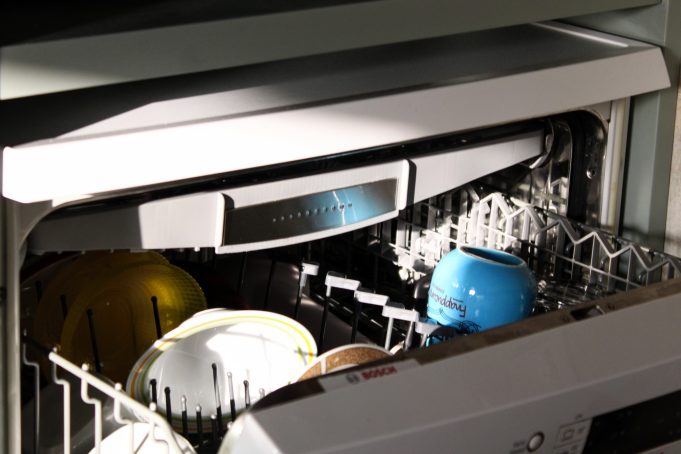Taking care of your dishwasher can seem like a tedious chore, but it’s essential if you want to avoid costly repairs and replacements.
Neglecting simple tasks like overfilling the dishwasher or using the wrong cleaning products can cause serious damage to your dishwasher’s components and shorten its useful life.
From preventing mineral deposits to avoiding rusted racks, there are many things you can do to ensure your dishwasher performs optimally.
This article will explore some common dishwasher mistakes and provide tips for keeping your appliance in top-notch condition.
Neglecting high mineral water content
While hard water doesn’t pose health risks, it’s one of the main culprits for broken dishes.
The mineral-rich deposits build up deposits, stains or a white film on your dishes, no matter the material they are made from.
Hard water also deteriorates your dishwashing machine’s performance, interior walls, pipes, and components and shortens your appliance’s useful life.
It doesn’t happen often, but if you notice blue or green stains around your appliance, this is a sign of acidic water. With such colourisation, your copper or brass pipes are at risk – they might erode.
Because highly-mineral water flows through valves and seals, limescale can form around them and cause water leaks and damage. Copper and PVC pipes are not susceptible to limescale build-ups, but steel pipes are endangered.
Low water pressure and blocked pipes would be frequent consequences, and you would need to call a handyman if you left the problem unattended.
You can avoid escalating hard water problems with quick and easy measures.
Extend the life of your dishwasher and plumbing system by making regular visual inspections (at least once per month), cleaning the inside of the dishwasher regularly, installing a water softener, applying water filters and conditioners, and the list goes on.
You will also avoid damaged components when you entrust the routine inspections of the critical components to a certified appliance engineer. He will thoroughly check the spray arm, filter, rubber components, gasket, and so on to ensure there are no clogged, worn-out parts or accumulated mineral deposits.
Overfilling the dishwasher
Overfilling your dishwasher is one of the most common mistakes homeowners make when loading their appliances.
When you cram too many dishes into the dishwasher, you limit the flow of water and detergent, which leads to incomplete cleaning and the risk of damaging your appliance. Overcrowded dishes are also more likely to bump into each other during the wash cycle, causing chipping and breakage.
Additionally, an overloaded dishwasher can cause the spray arm to get stuck, preventing it from rotating and cleaning your dishes effectively.
If you consistently overfill your dishwasher, you could shorten its lifespan and increase the likelihood of costly repairs.
Loading the dishes with the food scraps and debris
Brand-new appliances promise crystal-clean results even if you don’t rinse dishes before the dishwasher starts. To be on the safe side and avoid unexpected clogs inside the drain hose/dishwasher pump, go the old-school way – rinse.
Blocked dishwasher components are the most common appliance issue these days, besides the manufacturers’ promise of flawless operation without rinsing.
Yet, if you have a habit of inserting greasy plates with food particles, remember to use the rinse cycle. That’s how you will prevent disgusting odours and keep food from drying on the surface.
These habits feel like a chore, but we recommend cleaning the dishwasher once per month to remove food particles and prevent odours, grease or detergent residue. This way, you will prevent build-ups on the mechanical parts from going down the drain.
Neglecting rust on racks
Like everything in life, dishwasher racks are subject to wear and tear.
Not only exposed rusted coating on dishwasher racks scratch/break your plates or cups. But when rust chips off, the water washes them towards the appliance heater and reduces its efficiency.
So, when you notice a worn-off plastic coating, lay a touch-up paint colour to prevent the risk of corrosion and expensive repair work.
Using cheap dishwasher detergents and products
Opt for a top-rated dishwasher product to keep your appliance in top-notch condition. Before shopping, look for “detergent” on the cleansing product tag.
Don’t go the wrong way with inexpensive cleansing powders, as these can contain hard particles that might wreak havoc. Sooner or later, you will notice scratches on the appliance’s surface, clogs, leaks, and more.
Not installing surge protectors
A thunderstorm or a lightning strike is a huge threat to your appliance operation if you haven’t installed a surge protector. To protect your dishwasher or any other appliance from extreme weather and excess voltage, have a surge protector plugged in during the installation of the device.
Using the same appliance cycles and programmes every time
Having a high-quality dishwasher can go a long way to ensure that you have a more energy-efficient home.
However, don’t be tempted to use a lighter and faster program to lower your electricity and water bills. You won’t only lose cleaning efficiency but risk being left with dirty dishes and dirt and grim on the mechanical parts. Always select the right dishwasher cycle for sound performance and good component condition.
Using the ”Delayed Start” on a dishwasher over and over again
From a dishwasher to a washing machine, your appliance will withstand the test of time if you avoid the delay cycle. Even if the delay start option is helpful to run your appliance at cheaper evening energy tariffs, from a mechanical point of view, your appliance has to work harder to reach the required temperature. This way, you are literally wasting the appliance’s life.
Final thoughts
It’s crucial to read the manufacturer’s instructions and follow their recommendations for maintenance and cleaning. They recommend regularly replacing filters, checking and tightening connections, and inspecting the appliance for any signs of wear and tear.
Caring for your dishwasher can prevent the frustration and expense of dealing with unexpected breakdowns and repairs.
Simple habits like regular inspection, cleaning, and using appropriate cleaning products can go a long way in extending the lifespan of your appliance and improving its performance.
Consider having a professional conduct routine inspections of your dishwasher components for even better results. By avoiding common mistakes and following these tips, you’ll enjoy a cleaner, more efficient, long-lasting dishwasher and a stress-free everyday life.














